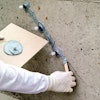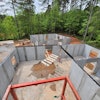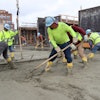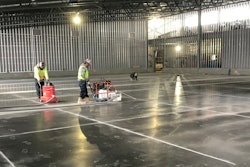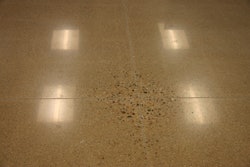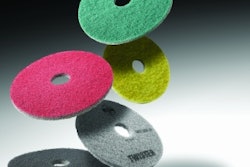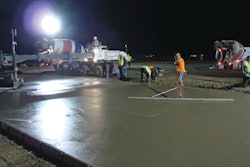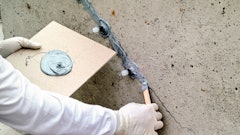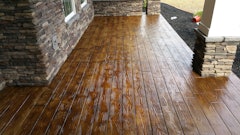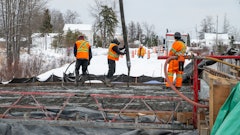LafargeHolcim recently released its 2020 first quarter (Q1) results amid the COVID-19 pandemic.
Highlights include:
- The company reported it is supported by a strong balance sheet, with a ratio of Net Financial Debt to Recurring EBITDA at 1.5x as at the end of 2019. The company has secured strong liquidity of CHF 8 billion and both credit ratings were recently confirmed.
- Early implementation and execution of the action plan “HEALTH, COST & CASH” will further strengthen business resilience.
- The biggest impact from COVID-19 is expected in the second quarter. The full impact of the crisis on the company’s 2020 results cannot be assessed at this point, it says. Given the encouraging April data on the rebound of activity in China, the company looks forward with confidence. More fundamentally, the building industry is resilient and expected to benefit from future recovery plans from governments and central banks.
“We are confronting an unprecedented health crisis with COVID-19 that is changing how we live and how we work in many ways," says Jan Jenisch, LafargeHolcim CEO. "Keeping our employees healthy and safe is our number one priority and core value. In early January, when the first signs of the pandemic emerged, we were quick to respond and take all the necessary measures to protect the health of our people while supporting our partners and communities, in full alignment with local authorities across our markets.
This crisis highlights how essential construction is to keep society running. I would like to extend my sincere gratitude to all our people around the world whose swift response to our new reality has been exemplary. It has allowed us to maintain vital business continuity so that we can play our role to address this crisis. I applaud the determination of all our front-line workers who are providing critical materials and services in challenging lockdown circumstances.
Our Q1 results show how resilient we are as a business. With our significantly strengthened balance sheet, we are in a very strong position to weather this storm. We are currently successfully executing our action plan “HEALTH, COST & CASH” in all countries, setting the company up for the recovery of our markets. I am confident that LafargeHolcim will emerge from this pandemic as an important contributor to economic recovery as building activity gets back to normal.”
Changing Market Conditions
The company had a strong start to the year as Q1 performance remained well ahead of last year’s results until mid-March, when the impact of COVID-19 spread beyond China into all business regions. Nevertheless, Q1 results remained resilient with net sales of -3.3% and Recurring EBIT -2.6% compared to the prior-year period, both on a like-for-like basis.
Europe delivered solid results despite disruptions in key markets, with good market growth in Eastern Europe and resilient performances in Switzerland and Germany, the company says. Volumes in France, the UK and Spain were impacted by COVID-19. Recurring EBIT improved on a like-for-like basis as a result of operational efficiencies.
North America delivered improvement in volume growth across all business segments. The region showed a continuation of cement demand trends from 2019, further supported by favorable weather, while aggregate volume improvement of 12% in the quarter was driven by megaprojects along the Mississippi River. The US and Canadian operations both delivered solid industrial performances, with only minor impact from COVID-19 in the quarter.
Latin America delivered a resilient performance, led by a solid performance in Mexico. Brazil, Argentina, Ecuador and Colombia were impacted by COVID-19 lockdown measures since mid-March. The Recurring EBIT margin was resilient thanks to effective price and cost management.
Performance of Asia Pacific was impacted by the COVID-19 outbreak, with China significantly impacted in Q1. There was strong profitability improvement in India despite lockdown measures towards the end of March. The market slowdown in Australia continued.
Middle East Africa delivered an over-proportional increase in Recurring EBIT with turnaround initiatives offsetting COVID-19 impact in the region. Nigeria, Algeria and Iraq were solid contributors, while South Africa and Lebanon were impacted by lockdown measures.
Credit Rating Confirmed
LafargeHolcim has a strong balance sheet and liquidity, with a ratio of Net Financial Debt to Recurring EBITDA of 1.5x as at the end 2019. As at the end of the quarter the company had secured strong liquidity of CHF 8 billion in cash and unused committed credit lines.
These strengths were recently confirmed on March 27, 2020, when S&P re-affirmed its BBB / outlook stable credit rating of LafargeHolcim, then again on April 20, 2020, when Moody’s re-affirmed its rating of Baa2 / outlook stable.
The company also executed successful re-financing in April 2020 by issuing a two-year, CHF 250 million 1.05% bond and a five-year, EUR 500 million 2.375% bond.
Action Plan “HEALTH, COST & CASH”
Since the beginning of the COVID-19 pandemic, LafargeHolcim has taken all necessary measures to protect its employees and partners. The company is closely monitoring all markets according to the evolving situation and to the guidance provided by the authorities in each country.
The development of the COVID-19 pandemic and its implications for the business remains volatile and very different from country to country. With a sharp focus on business resilience, the action plan “HEALTH, COST & CASH” is in full execution to meet the following targets:
- Reduction of CAPEX by at least CHF 400 million compared to 2019
- Reduction in fixed costs by CHF 300 million in 2020
- Realization of the reduction in energy prices and review of all third party products and services
- Reduction of Net Working Capital at least in line with the level of activity
Supporting Prevention, Mitigation of COVID-19
To promote the health and well-being of the communities where it operates, LafargeHolcim has been implementing a range of measures at country level from the very start of the pandemic, to support health efforts around the world. Services include:
- Supplying concrete and other building materials for emergency field hospitals and other public health infrastructure
- Driving public hygiene, from disposing of medical waste to sanitizing public spaces
- Leading awareness campaigns with employees, partners and communities
- Providing critical products such as masks, gloves and sanitizer gels
- Delivering basic goods such as prepared meals and water
In Wuhan and surrounding cities, for example, thousands of tons of cement have been donated for the rapid construction of makeshift hospitals. Reaching out to local authorities proactively to offer their support, local teams managed to execute on tight delivery schedules despite severe limitations on the movement of people and equipment, thus enabling the facilities’ ultra-fast construction. Local teams further supported public authorities with the disposal of COVID-19 related medical waste, while leading prevention awareness campaigns and donating personal protective equipment and basic goods.
